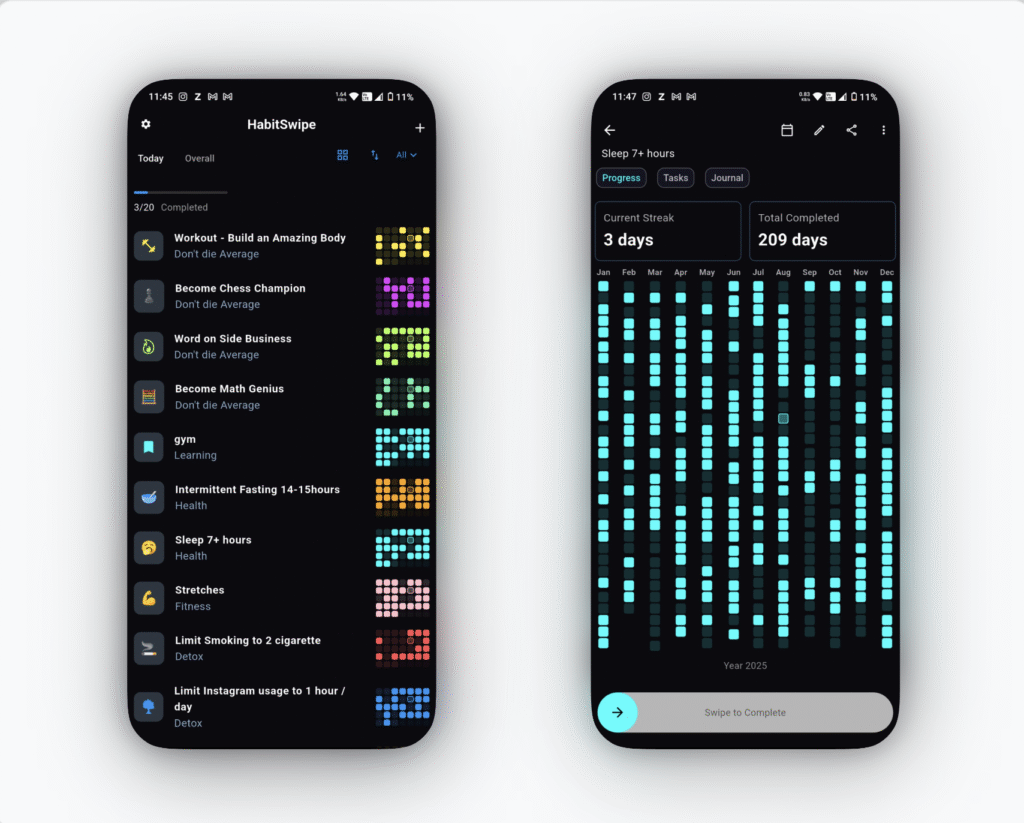Why Most Productivity Hacks Don’t Work
I’ve been obsessed with productivity and habit formation for years. I’ve built three different habit tracking apps, researched what actually moves the needle, and tested nearly every productivity hack on myself and thousands of users.
Here’s the truth: most “tips” sound good but collapse in real life.
But these 16 science-backed productivity habits? They work—consistently. Not just for me, but for the people using my apps and everyone I’ve studied.
👉 This time, Reddit is even helping me build a simple, elegant year grid habit tracker.
Full post -> ‘ Reddit is helping me build a Simple Habit Tracker ‘ – Link

The Non-Negotiable Habits
1. Procrastinate Strategically
Marc Andreessen uses this trick: procrastinate on big tasks by doing smaller—but still valuable—ones. The key is replacing bad procrastination (scrolling) with productive procrastination (emails, errands, planning).
2. Sleep Like Your Career Depends on It
Studies show that sleeping only 5–6 hours makes you 19% less productive. Leaders like Jeff Bezos swear by 8 hours.
Tips:
- Same bedtime & wake-up time
- Cold, dark room
- No screens before bed
- Track your sleep with a habit tracker
3. Move Your Body in the Morning
Morning workouts release BDNF (brain fertilizer) and endorphins. Even 20 minutes sharpens focus all day. Consistency > intensity.
4. Read Daily (Like Elon Musk)
Reading rewires your brain, improves memory, and reduces stress by 68%. Mix fiction (empathy & creativity) with non-fiction (knowledge & insights).
The Mental Game
5. Don’t Break the Chain
Jerry Seinfeld’s streak method works because we hate breaking streaks. In my habit trackers, users were 3x more likely to stick with habits past 60 days when using a streak calendar.
6. Meditate (10 Minutes a Day)
Backed by research. Improves memory, reduces stress hormones, and boosts decision-making.
7. Visualize Like an Athlete
Studies show visualization alone can increase strength by 13.5%. Spend 5 minutes before challenges imagining success.
8. Single-Task Everything
Multitasking = task-switching = poor quality. Work in 25-minute focus sprints for massive output.
The Systems That Scale
9. Apply the 80/20 Rule
Every week, ask: Which 20% of actions give me 80% of results? Double down on those. Cut the rest.
10. Make Better To-Do Lists
- Capture everything
- Estimate time per task
- Separate urgent vs. important
- Review weekly
11. Wake Up Early (Without Sacrificing Sleep)
Most executives rise before 6 AM. Early hours = uninterrupted focus. Just don’t cut sleep—shift your bedtime earlier.
12. Journal for 5 Minutes
Simple prompts:
- Morning: “What would make today great?”
- Evening: “What went well? What could be better?”
The Advanced Moves
13. Use Implementation Intentions
Instead of vague goals, say: “When it’s 6 AM, I will do 30 minutes of cardio in my living room after brushing my teeth.” This removes decision fatigue.
14. Trigger Flow States
- Clear goals
- Distraction-free environment
- Challenge just above your skill level
- Use focus music
15. Quit Social Media (Mostly)
The average person checks their phone 47+ times per day. Replace scrolling with reading, journaling, or walking.
16. Make Your Bed (First Win of the Day)
Navy SEAL Admiral William McRaven swears by this. It builds momentum and identity reinforcement.
How to Actually Implement These Habits
Here’s the #1 mistake: people try to change too much at once.
✅ Start with 2–3 habits.
✅ Stack them onto routines you already do.
✅ Track them visually with a habit tracking app like HabitSwipe.
Why tracking works: seeing your streaks mapped out builds identity-based habits. You don’t just do habits—you become someone who follows through.
Final Thoughts
After years of building habit trackers and studying productivity, I can tell you this: the magic isn’t in the “perfect habit.” It’s in building the system of consistency.
Start with one habit. Track it religiously. Watch what happens.
Your future self will thank you.